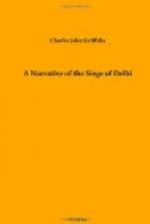We were relieved from picket on the morning of the 8th, and returned to our camp, remaining quiet during the day. Executions by hanging took place every day, but after the first horrible experience nothing would induce me to be a spectator. The rain, which had begun on the 3rd, continued almost without intermission, our camp becoming a quagmire, and the muggy, moist atmosphere increasing the ravages of cholera amongst our unfortunate soldiers.
July 9.—At sunrise on the 9th, a terrific cannonade woke us out of our sleep; but, the main camp being some distance from the right of the ridge, we for a long time heard no tidings of what was going on. At 8 a. m. the bugles of the regiments on the right sounded the alarm, followed at once by the “assembly.”
Some 200 men of my regiment, all that remained off duty, paraded in front of the tents, and received orders to march to the centre rear of the camp, in rear of the quarters of the General in command. Here we were joined by some companies of the 8th Regiment and a battalion of Sikhs, and, continuing our march, we halted near the tents of Tombs’ battery of Horse Artillery.
Lying around and even among the tent-ropes were dead bodies of the enemy’s cavalry, and a little way beyond, close to the graveyard, some men of the 75th were firing into the branches of the trees which surrounded the enclosure. Every now and then the body of a rebel would fall on the ground at their feet, the soldiers laughing and chatting together, and making as much sport out of the novel business as though they were shooting at birds in the branches of a tree.
How the native cavalry came there was at first inexplicable to us; but we were informed afterwards that a body of irregular horsemen, dressed in white, the same uniform as that worn by the 9th Irregulars on our side, had, with the greatest daring, an hour before dashed across the canal bridge and charged the picket of the Carabineers, making also for the two guns of Tombs’ battery. The former, mostly young soldiers, had turned and fled, all save their officer and one sergeant, who nobly stood their ground. Lieutenant Hills, who commanded the two guns on picket, also alone charged the horsemen, cutting down one or two of the sowars.
Meantime the guns were unlimbered, but before they had time to fire, the enemy were upon them. Hills was struck down badly wounded, and was on the point of being despatched by a sowar, when Major Tombs, hearing the noise, rushed out of his tent, and seeing the plight his subaltern was in, fired his revolver at thirty yards and killed the sowar.
The camp was now fairly alarmed; the guns of Olpherts’ battery opened on the enemy, and, some men of the 75th appearing on the scene, the rebels were shot down in every direction, thirty-five being killed, and the rest escaping by the bridge. A few climbed into the trees and were shot down as I have said before.




